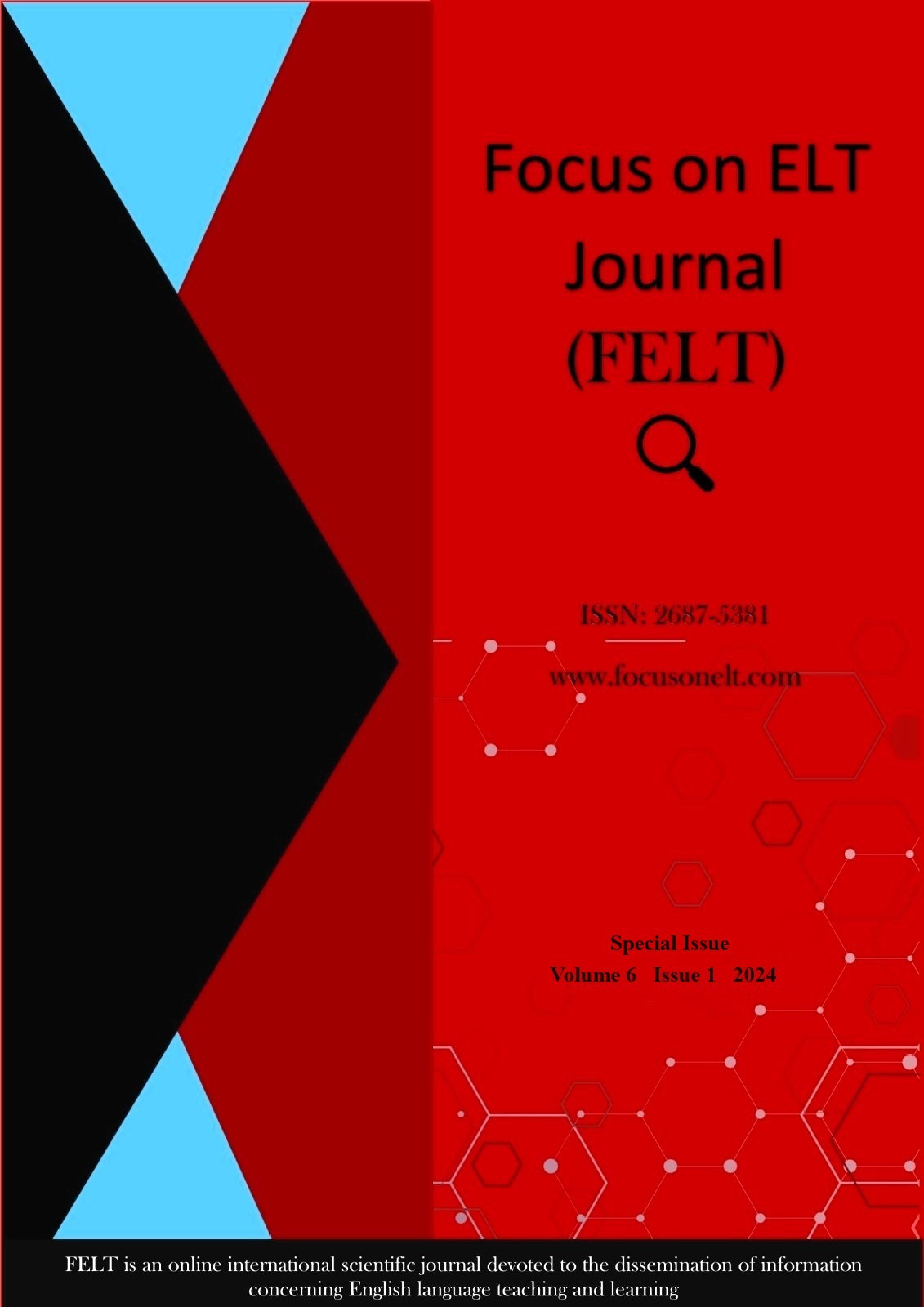Exploring opportunities and challenges of using ChatGPT in English language teaching (ELT) in Morocco
Main Article Content
Abstract
This article investigates the use of ChatGPT in English Language Teaching (ELT) in Morocco. It explores the opportunities and challenges associated with implementing it as a tool to enhance English language learning for Moroccan students, employing a mixed-methods approach. A questionnaire was administered to 62 ELT teachers in Morocco, and 12 interviews were conducted to validate and enrich the data. Findings shed light on the opportunities that ChatGPT offers in Moroccan ELT, including personalized learning, instant feedback, teachers’ professional development enhancement, and access to authentic language resources. However, the study identified challenges such as concerns about accuracy, cultural appropriateness, and excessive reliance on technology. The study informs ELT instructors and educational stakeholders in Morocco about the potential advantages and limitations of incorporating AI-based conversational agents like ChatGPT into ELT practices and promotes informed decision-making and effective integration of technology in language learning contexts.
Metrics
Article Details

This work is licensed under a Creative Commons Attribution-NonCommercial-NoDerivatives 4.0 International License.
References
Atlas, S. (2023). ChatGPT for higher education and professional development: A guide to conversational AI. Available at https://digitalcommons.uri.edu/cba_facpubs/548
Baskara, R. (2023). Exploring the implications of ChatGPT for language learning in higher education. Indonesian Journal of English Language Teaching and Applied Linguistics, 7(2), 343-358.
Brown, T., Mann, B., Ryder, N., Subbiah, M., Kaplan, J. D., Dhariwal, P., & Amodei, D. (2020). Language models are few-shot learners. Advances in neural information processing systems, 33, 1877-1901.
Chen, L., Chen, P., & Lin, Z. (2020). Artificial intelligence in education: A review. Ieee Access, 8, 75264-75278.
Coppin, B. (2004). Artificial intelligence illuminated. (1st ed.). Jones & Bartlett.
Cotton, D. R., Cotton, P. A., & Shipway, J. R. (2023). Chatting and cheating: Ensuring academic integrity in the era of ChatGPT. Innovations in Education and Teaching International, 61(2), 228-239.
Dibble, M. (2023, February 6). Schools Ban ChatGPT amid Fears of Artificial Intelligence-Assisted Cheating [Video]. VOA. https://www.voanews.com/a/schools-ban-chatgpt-amid-fears-of-artificial-intelligence-assisted-cheating/6949800.html
Dos Santos, A.E., Olesova, L., Vicentini, C., & de Oliveira, L.C. (2023). ChatGPT in ELT:Writing affordances and activities. TESOL Connections.
https://tcnewsletter.s3.amazonaws.com/newsmanager.commpartners.com/tesolc/issues/2023-05-01/2.html
Gill, S. S., Xu, M., Patros, P., Wu, H., Kaur, R., Kaur, K., ... & Buyya, R. (2024). Transformative effects of ChatGPT on modern education: Emerging Era of AI Chatbots. Internet of Things and Cyber-Physical Systems, 4, 19-23.
Guan, C., Mou, J., & Jiang, Z. (2020). Artificial intelligence innovation in education: A twenty-year data-driven historical analysis. International Journal of Innovation Studies, 4(4), 134–147.
https://doi.org/10.1016/j.ijis.2020.09.001
Halaweh, M. (2023). ChatGPT in education: Strategies for responsible implementation. Contemporary Educational Technology, 15(2), ep421. https://doi.org/10.30935/cedtech/13036
Haleem, A., Javaid, M., & Singh, R. P. (2022). An era of ChatGPT as a significant futuristic support tool: A study on features, abilities, and challenges. Bench Council transactions on benchmarks, standards, and evaluations, 2(4), 100089.
Harini, H. (2023). The Role of ChatGPT in Improving the Efficiency of Education Management Processes. Indo-MathEdu Intellectuals Journal, 4(2), 255-267.
Ivankova, N. V., & Creswell, J. W. (2009). Mixed methods. Qualitative research in applied linguistics: A practical introduction, 23, 135-161.
Jeon, J. & Lee, S. (2023), Large language models in education: a focus on the complementary relationship between human teachers and ChatGPT, Education and Information Technologies.
https://doi.org/10.1007/s10639-023-11834-1
Kartal, G. (2023). Contemporary language teaching and learning with ChatGPT. Contemporary Research in Language and Linguistics, 1(1), 59-70.
Koraishi, O. (2023). Teaching English in the age of AI: Embracing ChatGPT to optimize EFL materials and assessment. Language Education and Technology, 3(1). 55-72.
Kostka, I., & Toncelli, R. (2023). Exploring applications of ChatGPT to English language teaching: Opportunities, challenges, and recommendations. The Electronic Journal for English as a Second Language, 27(3). 01-19. https://doi.org/10.55593/ej.27107int
Latif, E., Mai, G., Nyaaba, M., Wu, X., Liu, N., Lu, G., ... & Zhai, X. (2023). Artificial general intelligence (AGI) for education. arXiv preprint arXiv:2304.12479.
Limna, P., Kraiwanit, T., Jangjarat, K., Klayklung, P., & Chocksathaporn, P. (2023). The use of ChatGPT in the digital era: Perspectives on chatbot implementation. Journal of Applied Learning and Teaching, 6(1), 64-74. https://doi.org/10.37074/jalt.2023.6.1.32
Lund, B. D. & Wang, T. (2023). Chatting about ChatGPT: how may AI and GPT impact academia and libraries?. Library Hi Tech News, 40 (3), 26-29. https://doi.org/10.1108/LHTN-01-2023-0009
Mhlanga, D. (2023). Open AI in Education, the Responsible and Ethical Use of ChatGPT Towards Lifelong Learning. Social Science Research Network, 2023, 4354422. https://doi.org/10.2139/ssrn.4354422
Moqbel, M. S. & Al-Kadi, A. M (2023). Foreign Language Learning Assessment in the Age of ChatGPT: A Theoretical Account. Journal of English Studies in Arabia Felix, 2(1), 71–84.
https://doi.org/10.56540/jesaf.v2i1.62
OpenAI. (2022). Introducing Chat GPT. https://openai.com/blog/ChatGPT/
Rahman, M. M., & Watanobe, Y. (2023). ChatGPT for education and research: Opportunities, threats, and strategies. Applied Sciences, 13(9), 5783.
Roumeliotis, K. I., & Tselikas, N. D. (2023). ChatGPT and Open-AI Models: A Preliminary Review. Future Internet, 15(6), 192.
Rudolph, J., Tan, S., & Tan, S. (2023). ChatGPT: Bullshit spewer or the end of traditional assessments in higher education? Journal of Applied Learning and Teaching, 6(1). 342-346.
https://doi.org/10.37074/jalt.2023.6.1.9
Sallam, M. (2023). The utility of ChatGPT as an example of large language models in healthcare education, research and practice: Systematic review on the future perspectives and potential limitations. https://doi.org/10.1101/2023.02.19.23286155
Söğüt, S. (2024). Generative Artificial Intelligence in EFL Writing: A Pedagogical Stance of Pre-service Teachers and Teacher Trainers. Focus on ELT Journal, 6(1), 58-73. https://doi.org/10.14744/felt.6.1.5
Sok, S. (2023, February 15). Opinion: Benefits and risks of ChatGPT in education. Cambodianess.
Susnjak, T. (2022). ChatGPT: The End of Online Exam Integrity? ArXiv Preprint ArXiv:2212.09292.
Thurzo, A., Strunga, M., Urban, R., Surovková, J., & Afrashtehfar, K. I. (2023). Impact of Artificial Intelligence on Dental Education: A Review and Guide for Curriculum Update. Education Sciences, 13(2), 150.
Zhai, X. (2022). ChatGPT User Experience: Implications for Education. Social Science Research Network, 4312418. https://doi.org/10.2139/ssrn.4312418
Zhuo, T. Y., Huang, Y., Chen, C., & Xing, Z. (2023). Exploring ai ethics of chatgpt: A diagnostic analysis. arXiv preprint arXiv:2301.12867.

